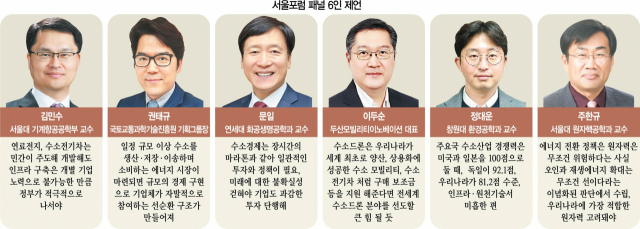Department News
[Seoul Economics Daily] Prof. Min Soo Kim at Seoul Forum 2021 – “Korean Hydrogen Industry Scores at 81… Must Invest in Infrastr
Author
관리자
Date
2021-06-11
Views
1152
[Seoul Forum 2021] "Korean Hydrogen Industry Scores at 81… Must Invest in Infrastructure and Nuclear Power"
■Advice from 6 experts at Seoul Forum
Even with top technology in hydrogen vehicles,
Production, storage, and transport are all inadequate
Government must improve infrastructure such as charging stations
In order to build an autonomous ecosystem
Nuclear power is cheaper than solar power
Making it more efficient for green hydrogen production

“For a fast, successful transition into hydrogen economy, we must invest in hydrogen production, storage, and transport technology, not just utilization.”
Hydrogen economy is expected to show exponential growth in 10 years, starting from 2030. From a long-term perspective, by 2050, around 21% of the total amount of energy used in Korea will be dependent hydrogen energy. Currently, fossil fuel takes up 26% of total energy use; this will be replaced by hydrogen energy. Moreover, hydrogen energy has the potential to be used in a wide variety of areas. Power generation, transport, construction, industry, and industrial raw materials will all be … hydrogen economy. Just in Korea, this will result in around 70 trillion won in revenue (2.5 trillion won worldwide) and create 600 thousand jobs.
What would it take for Korea to become numbere in hydrogen economy? At Seoul Forum 2021, experts agreed that establishing infrastructure such as manufacturing, storage, and transport and developing original technology will be just as important as utilizing hydrogen power itself. In addition, for energy security and independence, the country needs to approach nuclear power as an eco-friendly strategy, as it is most efficient in producing green hydrogen.
■Korea’s hydrogen industry competitiveness at 81 compared to US and Japan
The panel of experts concluded that compared to other major countries, Korea’s hydrogen competitiveness would score 81 out of 100, deeming it ‘inadequate.’ “Putting U.S. and Japan at 100, Germany scores 92.1, and Korea scores 81.2,” said Professor Dae-woon Jeong of Changwon National University Dept. of Environmental Engineering. “Compared to the distribution of hydrogen fuel cell electric cars, our original technology and competitiveness is lacking.”
This issue was pointed out by most of the 6 experts. “Looking at the entire hydrogen cycle, we are at a comparative disadvantage in all the areas except for hydrogen utilization,” explained Tae-kyu Kwon, Head of Project Planning Group of the Korea Agency for Infrastructure Technology Advancement. Professor Min Soo Kim of Seoul National University’s Dept. of Mechanical Engineering shared this concern, emphasizing the “urgent need for technology development.” Dosoon Lee, CEO of Doosan Mobility Innovation, also agreed that infrastructure expansion is crucial. Out of six experts, four expressed concerns about Korea’s hydrogen industry.
The main reason for inadequate competitiveness was lack of infrastructure in hydrogen production, storage, and transport. “We have the best technology in hydrogen electric vehicles,” said Prof. Kim. “but issues with the production, storage, and transport of hydrogen must be solved.” This speaks to the lack of government involvement in establishing hydrogen infrastructure, despite the business sector doing its part.
■Government’s role in creating hydrogen ecosystem
Building the hydrogen infrastructure is crucial because it is a precondition for establishing a hydrogen market. “The government should take the role of creating a hydrogen market, designing an autonomous ecosystem,” said Kwon. “Once we have an energy market above a certain level of hydrogen production, storage, transport and consumption, an economy of scale will occur, inviting more businesses into the market.” They also spoke about the need for hydrogen fueling stations. “The quality of our hydrogen fueling stations rank at number 5 in the world, but there are about 40 spots nationally. To improve hydrogen mobility, we need to build more fueling stations,” said Lee.
The government could utilize pre-existing networks to build hydrogen infrastructure, they suggested. “Investments in hydrogen industry should lead to increases in market size,” said Professor Il Moon of Yonsei University’s Dept. of Chemical and Biomolecular Engineering. “The government must provide support by utilizing pre-existing networks, like using the national natural gas pipeline to transport hydrogen.” Once there is a hydrogen ecosystem that creates profit, businesses will make investments and hydrogen industry will show exponential growth.
If we compare the hydrogen infrastructure to human blood vessels, green hydrogen would be the blood running through them. Experts claimed that in order to build an autonomous hydrogen ecosystem, it is crucial for green hydrogen to be domestically produced. “About 50% of green hydrogen production technology comes from overseas, which increases the unit cost of production,” explained Prof. Jeong. “It is not that we lack the technology. The technology is already there, but we don’t have the system through which we can use it. That’s why we end up using imported technology and materials.”
■Green hydrogen production should use nuclear power
Korea lacks underground resources and has weak winds, unfit for wind power generation. So energy experts advocate nuclear power as the method of production for green hydrogen. “The unit cost for green hydrogen production via electrolysis is affected by the capacity factor and electricity price,” said Professor Han-gyu Joo of Seoul National University’s Dept. of Nuclear Engineering. “If we compare solar power with nuclear power, nuclear power costs half as much as solar power in terms of electricity price. The capacity factor is at 85% as well, compared to that of solar power, which is 15%. So the unit cost of production is much less expensive if we use nuclear power.”
Green hydrogen production can be done at a reasonable price using nuclear power. It is important that citizens view nuclear power in a positive light. “So far, energy policies have been misled by mistaken judgments about the ‘dangers’ of nuclear power, blindingly pursuing renewable energy instead of relying sophisticated analysis and predictions,” Prof. Joo pointed out. “We must think about expanding the use of nuclear power as the most suitable energy source for Korea.”
/Jong-gap Seo gap@sedaily.com
Source : https://www.sedaily.com/NewsView/22NJMSKVU4

